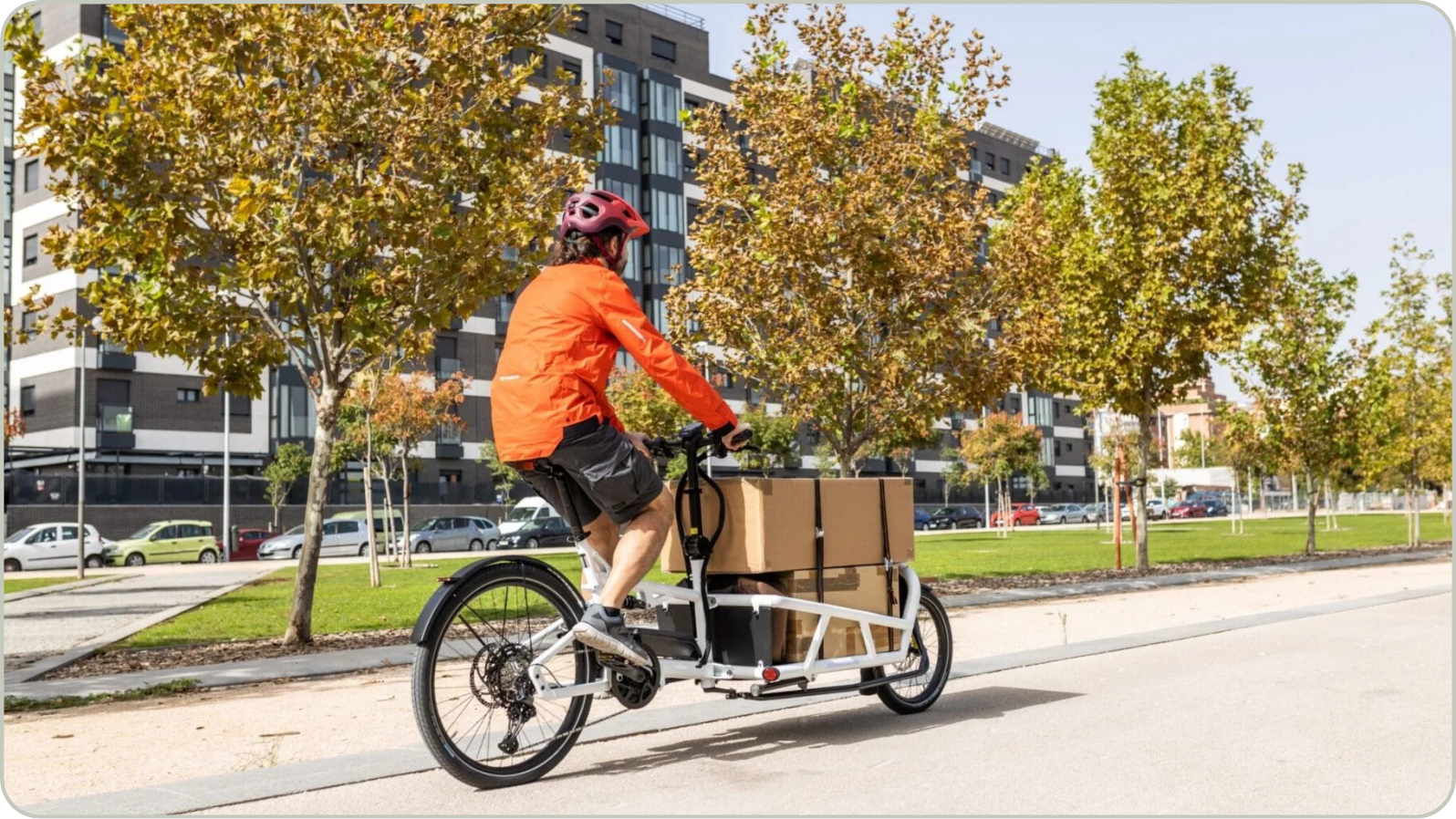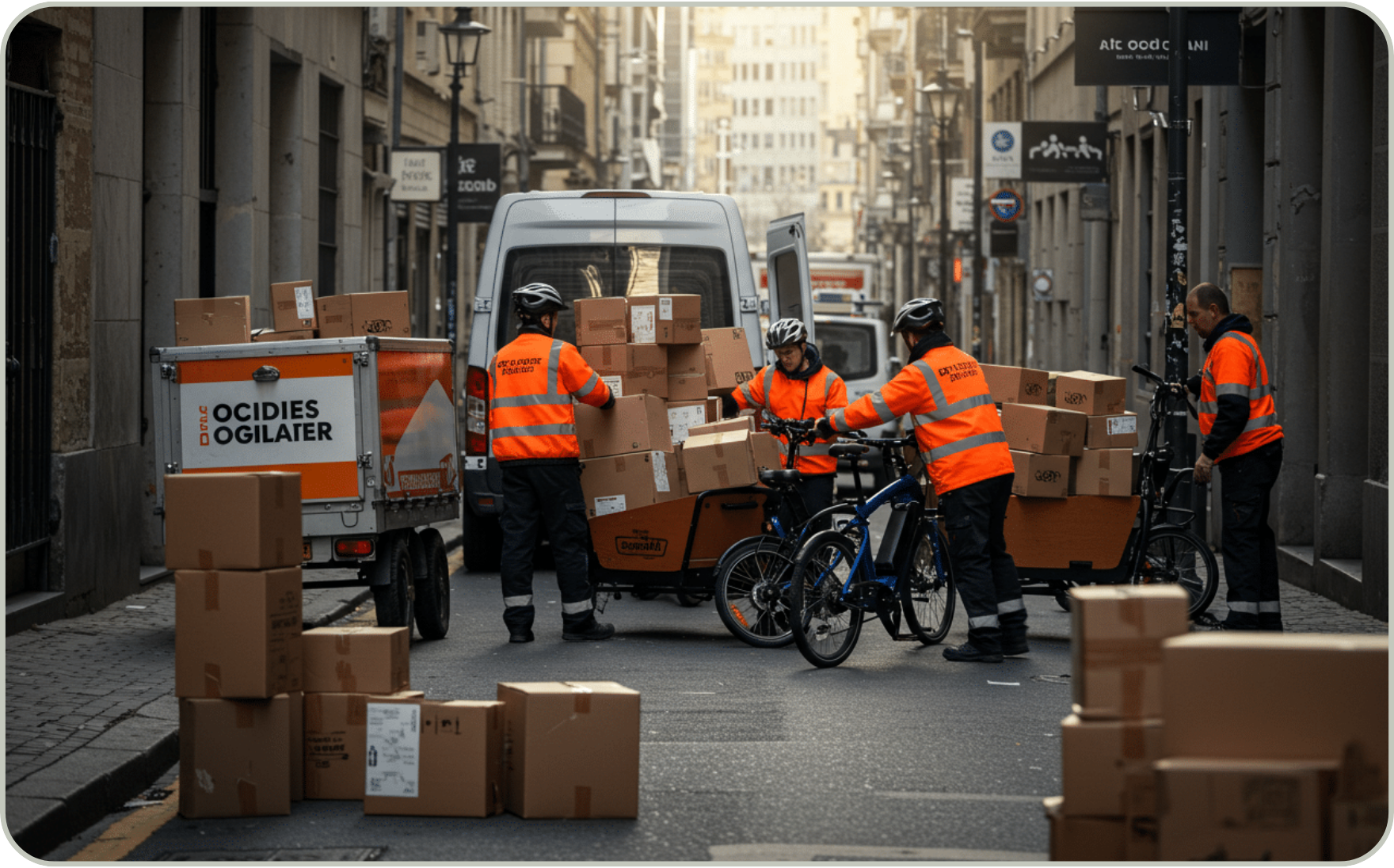🚲 The Urban Cargo Bike Revolution: A Playbook for European Cities
Cargo bikes are transforming urban logistics across Europe—reducing emissions, easing congestion, and improving delivery efficiency. Discover practical strategies to scale cycle logistics and shape a cleaner, more livable city.
%20(1)%20copy%203.png)
📩 Stay updated on industry trends & Vianova product updates—subscribe to our Newsletter here!
Introduction: Setting the Scene for Urban Transformation

European cities face increasing challenges from urban logistics, including congestion, pollution, and safety concerns due to growing e-commerce and heavy goods vehicles. A powerful, sustainable solution is rapidly gaining traction: the cargo bike. These versatile vehicles, from pedal-powered to electric-assisted (e-cargo) models, are a key answer to urban freight dilemmas.
Cycle logistics, integrating bicycles into goods movement, offers a compelling alternative for last-mile deliveries, especially in dense urban cores where traditional vehicles are inefficient. The European Union supports this shift, with studies suggesting up to 50% of urban goods transport trips could transition to bikes or cargo bikes. This playbook provides European cities with actionable strategies and insights to foster large-scale adoption of cargo bikes, aiming for greener, more efficient, and livable urban environments.
Why Cargo Bikes? The Transformative Benefits for Urban Europe

♻️ Environmental Imperatives: Emissions, Noise, and Air Quality
Cargo bikes significantly reduce greenhouse gas emissions, air pollution, and noise pollution by replacing fossil fuel vehicles. A Belgian study showed a 98% reduction in CO2 emissions when diesel vans were replaced with cargo bikes, alongside a significant decrease in noise. These vehicles contribute to cleaner air and quieter streets, aligning with city emission reduction targets, as seen in Barcelona's Low Emissions Zone (LEZ) strategy.
💸 Economic Efficiencies: Cost Savings, Productivity, and Job Creation
Cargo bikes offer substantial economic benefits by eliminating fuel costs, mitigating congestion, and avoiding parking fees. Their agility enhances delivery efficiency; Last Mile Manchester's e-cargo bikes achieve 10-12 drops per hour, outperforming DHL vans (6-8 drops/hour) in congested areas. A Belgian study found cargo bikes 28% faster in dense urban areas, leading to 30% faster completion rates in Brussels' city center and saving logistics companies up to three hours per 100 deliveries.
Cycle logistics projects in Europe consistently show high profit and profitability, demonstrating a strong business case beyond environmental responsibility. Expansion also fosters local job creation, supporting social programs for reintegrating unemployed individuals.
👥 Social & Urban Livability: Congestion Relief, Public Space Reclamation, and Community Well-being
Cargo bikes occupy less space than vans, alleviating congestion and freeing public space for active travel or green infrastructure. They enhance road safety, especially in pedestrian-heavy areas, and reduce stress for delivery personnel. A Belgian survey noted rare major injuries from cargo bike accidents, with no fatalities reported, highlighting their safety in urban settings. Beyond logistics, cargo bikes foster social inclusion, exemplified by Denmark's "Cycling Without Age" campaign, which provides cargo bike trips for the elderly.
Beyond Delivery: Diverse Applications of Cargo Bikes in European Cities
Cargo bikes' versatility extends beyond traditional package delivery, making them a multi-faceted tool for urban transformation across various sectors. This broad applicability suggests cities should promote them as a versatile solution, accelerating large-scale adoption and building resilient urban mobility.

- Last-Mile & B2B Logistics: Major carriers like DHL and UPS use cargo bikes for "last-mile" segments in European cities. Examples include grocery delivery (Rita Bringt's, Vienna) and B2B deliveries (Berlin's BentoBox pilot, 85% by cargo bike).
- Municipal Services & Public Operations: Cities lead by example; Seville uses 200 cargo bikes for street cleaning, and Vienna has a cargo bike fleet for city services. The Brussels cAIRgo Bike project helped over half of Brussels' municipalities adopt them for services.
- Community, Social, and Family Uses: Cargo bikes supported crisis efforts (Lisbon distributing food/medication during COVID-19, Copenhagen deploying medical cargo bikes for samples). They also offer benefits for family transportation, reducing emissions and promoting physical activity.
European Pioneers: Inspiring Case Studies and Performance Insights
Europe leads in cycle logistics, with many cities demonstrating cargo bikes' tangible benefits and operational success.

- 🇩🇰 Copenhagen: Integrated cargo bikes for medical sample distribution during the pandemic.
- 🇦🇹 Vienna: Invested in a municipal cargo bike fleet, inspiring private sector adoption and shifting 200,000 km of vehicle driving to cargo bikes for services like meals-on-wheels.
- 🇪🇸 Barcelona: Implemented a 600,000-euro grant program for last-mile delivery and a 95 sq km Low Emissions Zone (LEZ). A pilot with Vanapedal reduced CO2 emissions by 95.9% and noise by 21.7%.
- 🇧🇪 Brussels: The Cairgo Bike project demonstrated cargo bikes' professional utility, assisting over half of Brussels' municipalities. Proactively addressing rising bicycle theft with innovative parking solutions.
- 🇩🇪 Berlin: BentoBox pilot achieved 85% of last-mile B2B trips by cargo bike.
- 🇨🇭 Switzerland (Carvelo2go): E-cargo bike sharing platform with over 17,000 users and 46,000 journeys across 70 cities, demonstrating sharing model viability.
These examples highlight cargo bikes' superior performance in urban environments, consistently outperforming vans in dense areas (28% higher delivery rates in Belgium, 30% faster in Brussels' city center). This translates to 10-12 drops per hour for cargo bikes versus 6-8 for vans in congested areas, leading to significant cost savings and improved reliability for logistics operators.
The European City's Playbook: Pillars for Accelerating Cycle Logistics

🚧 Pillar 1: Robust Infrastructure & Smart Urban Planning
Suitable infrastructure is foundational. Cities must address limited urban space and rising bicycle theft (e.g., 70% increase in Brussels reported thefts 2015-2022) by converting car spaces, creating fenced cargo bike zones, and implementing intelligent access systems. This investment in secure parking is critical for mitigating theft, which is a major financial risk given cargo bikes' higher initial cost.
Existing cycling infrastructure often lacks the necessary width for larger cargo bikes; cities need connected networks with sufficient width and clear signage, including cycling contra-flow. Promoting intermodality is crucial, involving micro-hubs near transport stations or integrating shared cargo bikes into metro systems, as seen in Brussels.
⚖️ Pillar 2: Progressive Policy, Regulation & Safety Standards
Urban access regulations are powerful policy levers. Low Emission Zones (LEZs) and city-wide speed limits (e.g., 30 km/h) restrict polluting vehicles, creating a favorable environment for cargo bikes. Barcelona's comprehensive LEZ is a prime example.
Clear and robust cargo bike safety standards, complementing existing series like BS EN 17860 and EAPC regulations, are crucial for preventing accidents and building public trust. Updating urban planning regulations to facilitate inner-city consolidation centers and micro-hubs is also essential.
💶 Pillar 3: Strategic Incentives & Sustainable Funding
Financial incentives effectively stimulate adoption. Over 60 subsidy schemes exist in Germany and Austria, and cities like Gdynia in Poland support cargo bike purchases. Rapid depletion of funds in cities like Berlin, Vienna, and Salzburg indicates significant latent demand when financial barriers are lowered.
Beyond subsidies, practical support like rider training, loan bikes, and designated on-street parking is vital. European cities can leverage EU funding from programs like Horizon2020 (City Changer Cargo Bike), Horizon Europe (DECARBOMILE, URBANE), and GREEN-LOG, which align with the European Green Deal and CIVITAS Initiative.
🚴 Pillar 4: Fostering a Pro-Cycling Culture & Awareness
Addressing lack of awareness and misperceptions about cargo bikes' capabilities is paramount. Public education campaigns can highlight environmental, economic, and social benefits. Providing rider training and "try before you buy" opportunities, alongside real-life testing, helps professionals experience cargo bikes in their daily work.
Cities must lead by example: municipal procurement should encourage cycle logistics, and city departments should integrate cargo bikes into their own fleets, as seen in Seville, Vienna, and Jette in Brussels.
🤝 Pillar 5: Collaborative Ecosystems & Technological Innovation
Robust public-private partnerships are essential for infrastructure, micro-hubs, and last-mile solutions. Collaborations between public agencies (e.g., Parking.brussels) and private companies (e.g., BePark, UPS) are critical.

Embracing digital tools and the micro-hub concept is vital. Micro-hubs are small physical spaces for urban freight management, including charging, secure parking, and goods transhipment. They are fundamental for greener, more efficient urban logistics and public space optimization, often becoming intermodal and collaborative nodes. Technological advancements like geolocation tools, real-time communication, and route optimization are essential.
Finally, the evolving vehicle landscape, including modular designs, trailer-based systems, and "micro-vans" (e.g., Bradshaw's Goupil G4, Renault Bento quadricycle), offers expanded possibilities, bridging the gap between traditional vans and pedal-only cargo bikes with greater payload capacity and range.
Navigating the Road Ahead: Addressing Common Challenges

- Overcoming Perceptions and Resistance: Address ingrained reliance on vans and lack of awareness through demonstration projects, loan schemes, and hands-on training.
- Managing Initial Investment Costs and Business Model Integration: Support businesses in adopting mixed-fleet approaches and investing in micro-hubs to optimize operations.
- Tackling Parking Scarcity and Theft: Implement dedicated parking infrastructure, robust security, and clear urban planning regulations.
- Unfavorable Weather Conditions and Interactions with Other Road Users: Address these in rider training and infrastructure design to enhance safety and comfort.
Conclusion
Cargo bikes are a scalable and sustainable solution poised to define the future of urban logistics. Their unparalleled environmental, economic, and social benefits in dense urban environments make them indispensable for cities committed to a sustainable future. By reducing emissions, alleviating congestion, enhancing air quality, and fostering vibrant public spaces, cargo bikes are integral to achieving zero-emission last-mile deliveries and creating healthier, greener, and more livable cities, aligning with broader European sustainability goals.
The evidence from pioneering European cities demonstrates that a comprehensive, multi-pillar approach is key to success. By strategically investing in infrastructure, enacting progressive policies, implementing incentives, fostering a pro-cycling culture, and embracing collaborative ecosystems and technological innovation, European cities can accelerate the urban cargo bike revolution. The time for this transformative change is unequivocally now.
About Vianova

Vianova is the data analytics solution to operate the mobility world. Our platform harnesses the power of connected vehicles and IoT data, to provide actionable insights to plan for safer, greener, and more efficient transportation infrastructures.
From enabling regulation of shared mobility to transforming last-mile deliveries, and mapping road risk hotspots, Vianova serves 150+ cities, fleet operators, and enterprises across the globe to change the way people and goods move.
Ready to learn more? Visit our page to get in touch.
👉 Read our previous blog here!
Become part
of the movement
in the Vianova world.
Let's get in touch
Lets talk! We are excited to hear how we can help you solve your mobility challenges.




